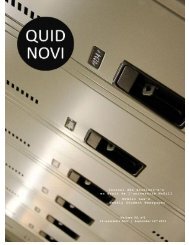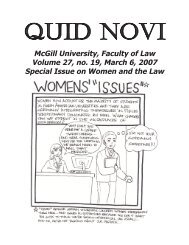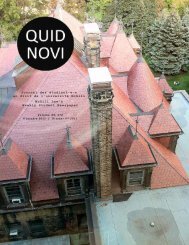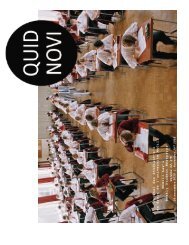March 23, 2010
March 23, 2010
March 23, 2010
Create successful ePaper yourself
Turn your PDF publications into a flip-book with our unique Google optimized e-Paper software.
QUID NOVI<br />
IN THE MATTER OF a Reference<br />
by Charlie Feldman to the Judicial<br />
Board concerning the interpretation<br />
of certain provisions of the LSA Constitution<br />
Friday, <strong>March</strong> 19, <strong>2010</strong><br />
Present : Annamaria Enenajor, Brett<br />
Hodgins and Jessica Syms<br />
Jurisdiction:<br />
Pursuant to s. IX 33 (1) of the LSA Constitution<br />
which states “Any member of<br />
the Corporation or any LSA Group may<br />
refer questions or disputes to the Judicial<br />
Board”, the Judicial Board has accepted<br />
the following reference questions from<br />
2nd Year Class Co-President Charlie<br />
Feldman:<br />
Question 1: Is it the duty of the CRO to<br />
set an election date that allows the LSA<br />
Council to meet its exigencies per Constitution,<br />
or, apart from the formal requirements<br />
indicated does the CRO have<br />
complete discretion in this regard<br />
Question 2 (a): May items for which the<br />
Constitution specifies a date (such as<br />
election of LSA Speaker by October<br />
15th, adoption of the preliminary budget<br />
by Oct 30th) occur after these dates May<br />
they be challenged for failing to comply<br />
with the Constitution Or, will they be<br />
valid in an instance such as ours where<br />
Council has failed to meet<br />
Question 2(b): When a date is specified<br />
by the Constitution, are the actions required<br />
to occur before that date legitimate<br />
if performed after that date Are<br />
there circumstances in which noncompliance<br />
is acceptable<br />
Question 3: Acting under V-15, is it acceptable<br />
for the Executive to undertake<br />
any actions that Article IV-17 suggest<br />
may be reserved for Council<br />
Question 4 (a): Can LSA Council meet<br />
prior to the election of first-year class<br />
4<br />
presidents and faculty council<br />
Question 4(b): If yes, who sits (I.e. does<br />
V-15 preclude elected class presidents<br />
and the law senator from convening with<br />
the Executive in the form of the Legislative<br />
Body)<br />
Question 4 (c): If yes, may the Council<br />
vote May it adopt its own budget or<br />
must the full Council – including firstyear<br />
presidents –be reserved the right to<br />
vote on this as IV-17 appears to indicate<br />
Question 4 (d): If no, and there are no<br />
meetings occurring that include those<br />
persons elected for the academic year,<br />
how might the full Board convene to fulfill<br />
its responsibilities<br />
Answers in brief:<br />
Question 1: Yes, in principle the CRO is<br />
constrained by the exigencies of the entire<br />
Constitution, and not just those directly<br />
relating to his or her duties.<br />
However, as the “deadline” provisions in<br />
question have been found to be invalid<br />
below, the CRO will not be bound by<br />
them.<br />
Question 2 (a) (b) (c) are answered together:<br />
Yes, actions for which dates are<br />
set by the Constitution may be held after<br />
these deadlines. The deadline provisions<br />
themselves are void for uncertainty.<br />
Question 3: No, the Executive (“transitory<br />
body”) may not undertake actions<br />
specifically set for Council, only the<br />
day-to-day operations of the LSA.<br />
Question 4(a)- (d) answered together:<br />
No, the Council may not (officially)<br />
meet prior to the fall election.<br />
Reasoning:<br />
Question 1 :<br />
Per Syms : À prime abord, j’accepte<br />
qu’en accord avec les articles 15(1), 17(f)<br />
et (12) de la Constitution de la Faculté de<br />
Droit de McGill, le CRO jouisse d’une<br />
entière discrétion quant au choix de la<br />
date du déroulement des élections à la<br />
session d’automne. Cependant, je ne suis<br />
pas d’accord quant à la proposition selon<br />
laquelle le CRO n’a pas à tenir compte<br />
des échéances constitutionnelles imposées<br />
à l’Exécutif. Je suis d’avis qu’une date<br />
limite pour les élections d’automne devrait<br />
être déterminée afin de permettre le<br />
fonctionnement le plus facile de tous les<br />
différents organes constitutionnels assurant<br />
la gestion et gouvernance du corps<br />
étudiant de la faculté. Bien que chacun<br />
soient techniquement indépendants les<br />
uns des autres, je suis d’avis que tous les<br />
groupes constitutifs du mécanisme<br />
constitutionnel de la Faculté doivent tenir<br />
compte les uns des autres dans leurs actions<br />
afin de faciliter le fonctionnement<br />
général de la Faculté de Droit de McGill<br />
sur le plan constitutionnel.<br />
La détermination d’un délai acceptable<br />
pour les élections d’automne ne viendrait<br />
pas, selon moi, limiter le pouvoir discrétionnaire<br />
du CRO de manière déraisonnable.<br />
Ceci viendrait plutôt faciliter le<br />
déroulement des tâches des autres organes<br />
constitutionnels de la Faculté. L’ensemble<br />
de la communauté étudiante<br />
désirant être mise au courant le plus tôt<br />
possible des décisions prises par l’Exécutif,<br />
surtout en ce qui concerne le budget<br />
adopté, il est important que ce dernier<br />
puisse se réunir le plus tôt possible dans<br />
la session.<br />
Par conséquent, je propose qu’une date<br />
limite soit déterminée pour les élections<br />
se tenant à l’automne afin de favoriser le<br />
meilleur fonctionnement possible au sein<br />
des tous les organes exécutifs de la Faculté<br />
de Droit de McGill.














